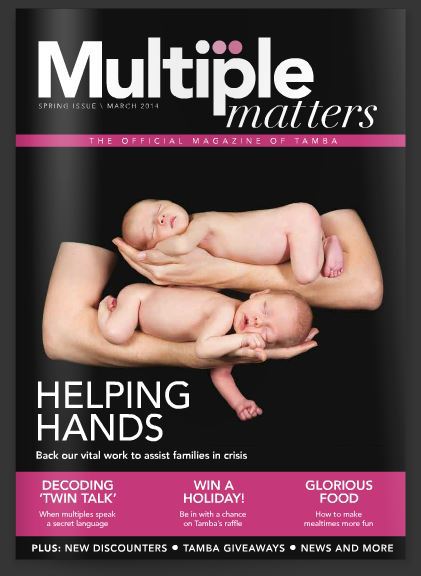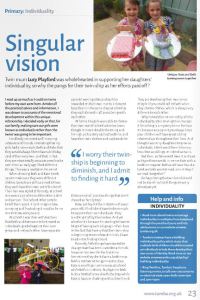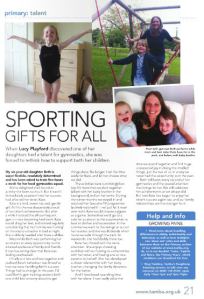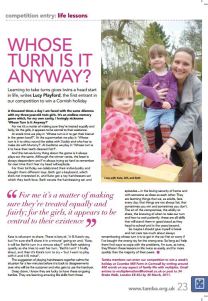
I was lucky enough to get my first and my second baby at exactly the same time! Being a Mama to twins comes with challenges but also remarkable benefits. I love sharing the stories that come with being a twin Mama and some of my articles have been published in parenting magazine Multiple Matters.
Singular Vision
 I was wholehearted in supporting my daughters’ individuality, so why the pangs for their twin-ship as my efforts paid off? (Autumn 2014)
I was wholehearted in supporting my daughters’ individuality, so why the pangs for their twin-ship as my efforts paid off? (Autumn 2014)
Trying to raise your twins to be individuals without losing their sense of twin-ship can often be at the forefront in the mind of multiple parents. Now her twin girls are turning seven Lucy Playford reflects on what this has meant for her family and tells how this little battle has pulled her in two directions.
Pretty much like all new-parents-to-be I tried to read-up as much as I could on having twins before they were born. Amongst all the invaluable practical advice and information I came across, I was also drawn to the fascinating side of the emotional developments of the unique twin relationship. I decided early on, that for our family, making sure our girls were known to be individuals (rather than ‘the twins’) was going to be important.
I thereby embarked upon endless amounts of time correcting well-meaning relatives and friends that my girls had a name each, Beth and Kate. That they would very much always like to have a birthday card of their very own and that in fact they were two totally separate people that, even from a very early age, liked different things! This was a real revelation for some of them!
When dressing Beth and Kate I would take care to make sure they wore different clothes (people are still surprised today when I tell them they have their own set of knickers each!), they had their hair styled differently and even for school uniform one wears a pinafore and the other a skirt and jumper. As much as anything this helped other people to tell them apart from each other. I can’t imagine how annoying and frustrating it must be for no one to know who you are!
Once they started school I was clear with each teacher across the years that Beth and Kate were to be treated as individuals, graded against their peer group and not each other, have separate parents evening slots and each be rewarded on their own merit. I always chose to keep them in the same classes at school as they both thrived in all areas being with each other.
At home the girls chose their own after school activities (even though it meant double the too-ing and fro-ing to extracurricular classes), picked a story each at bedtime and have their own shelves and cupboards for their personal, precious things which aren’t classed as ‘family toys’.
Now as they are growing up I find I have to try a lot less hard to make them individuals. They are starting to this all by themselves! And whether it’s because it’s the beginnings of my letting go over having such a big say in their lives, or the fact that I worry that their twin-ship is beginning to somehow diminish, I have to admit to finding it hard.
Recently little things have started to change; Kate has been invited to a friend’s house on her own for the first time. Sometimes they don’t share a bedtime as Beth is out late at her gymnastics class. Kate is excelling in some areas at school while Beth is enjoying others. At playtime Beth can be found kicking a football around with the boys while Kate is happier chatting with a close friend. They are developing their own sense of style (if you could call it that!) when they chose clothes to buy, which is always very different from each other.
Why I should be so concerned by all this individualism after striving so long for it is a mystery to me. I guess it’s because as a parent you always hope your children will continue to have great sibling relationships throughout their lives. Having said that I’m pretty hopeful that just because my twins grow up to be individuals it isn’t going to make them any less close as siblings or indeed twins.
As fate would have it Kate has just come into me whilst I type this over their bedtime saying, “Beth and I have found a book we both want to read, so is it okay if we read it together?” I guess losing their close twin bond maybe not be top of the list of things to worry about just yet.
A sporting gift for all
 I tell how one of my twins’ sporting talents ended up benefiting the whole family. (Autumn 2013)
I tell how one of my twins’ sporting talents ended up benefiting the whole family. (Autumn 2013)
Beth, one of my six year old twins, has a gift for gymnastics. She’s super flexible, resolutely determined and has a natural talent for the sport. So much so that she’s been asked to train five hours a week for her local squad.
While we are all thrilled for her success and delighted she has found an activity she’s clearly good at and loves so much, it has left her twin sister, Kate, somewhat on the sidelines – watching her sibling achieve.
It’s only looking back over the last six months that I’ve realised how this success for Beth has affected Kate.
Kate is a very kind, sweet natured, gentle little girl. At first she was desperately proud of her sister’s achievements, telling their cousins of Beth’s latest certificates and glowing herself when Beth came home with a sticker for mastering a new skill. But after a little while I started to notice that the all too frequent ‘gym run’ was becoming hard work.
Kate was dragging her feet as I was dragging her to pick-up or drop-off yet again. She started regularly complaining that her ‘tummy was hurting’ on the way to school or in bed at night and she suddenly needed a lot more cuddles than previously.
Meanwhile Beth was basking in the glory of proud parents and happily performing her acrobatics at every opportunity to the amazed gasps and applause of family and friends. It was becoming clearer that Kate was feeling over-looked.
Once I finally put two and two together, and realised Kate’s behaviour was linked to how we were handling Beth’s success, I realised things had to change.
In the past when Beth had been at gym it was a chance for me to catch up on jobs, with one less child to worry about, and a time to get things done. Instead I made a decision to set that time aside especially for Kate.
I decided to let her choose what we did while Beth was at gym; they were all surprisingly low key, simple things. It turns out it doesn’t matter what we do, it’s just that we do it together (albeit with her baby brother in the background!!) and on her terms.
During the winter months we stayed in and watched her favourite TV programme (actively watched it – not let it just wash over me!). Kate would chose one of her jigsaws to do together or a game she’d like to play. Sometimes we’d have a treat and go to a cafe for a cake or just go to the supermarket and look at the clothes and accessorise she liked. In the summer we have been out to the swings or out on her scooter and she decides which route we ride through the park. It turns out, the only thing better than having one on one time is having two on one time as at the weekends Daddy joins in the fun too!!
Kate has thrived under the extra attention, choosing activities for herself without having to compromise with her sister and having one or two parents all to herself for hours on end.
She has also enjoyed developing a closer relationship with her baby brother, changing the family dynamics for the better.
And I have loved spending time with her alone. I now really value and enjoy the time we spend together and find huge unexpected joy in doing the smallest things together, just the two of us, in a way we never had the opportunity to in the past!
Beth still loves every second of her gymnastics and the special attention that brings for her (we still celebrate all her achievements as we always did). but now Kate has begun to enjoy her sisters success again too and all our family relationships are all the stronger because of it.
Whose Turn is it Anyway
 Learning to take turns give twins a head start in life. (Autumn 2010)
Learning to take turns give twins a head start in life. (Autumn 2010)
A thousand times a day, I am faced with the same on-going dilemma with my three-year old twin girls. It’s an endless memory game which (for my own sanity) I lovingly nickname ‘who’s turn is it anyway?’. For me it’s a matter of making sure they’re treated equally and fairly; for the girls it appears to be central to their existence. At snack time we play it, ‘who’s turn is it to get their biscuit in the green bowl?’ at the Supermarket we play it, ‘who’s turn is it to whizz round the aisles with Daddy and who has to make do with Mummy?’ at bedtime we play it, ‘who’s turn is it to have their teeth cleaned first?’’. And the not so funny thing about the game is it always plays out the same. Although the winner is always different, the loser is always despondent and I’m always trying so hard to remember for next time that I fear my head will explode!
For their birthday we celebrated their individuality and bought them different toys, Beth got a keyboard which she’s not interested in and Kate got a toy hairdressers set, which they both love. Beth covets the hairdressing set and Kate is reluctant to share. There is lots of, “it IS Kate’s toy, but I’m sure she’ll share it in a minute” going on and, “Kate, it will be Beth’s turn in a minute okay?” and Beth sobbing quietly as she tries to wait her turn. “Beth’s turn!” I finally shout, and then it’s Kate’s turn to cry, “but I want to play with it and it is mine!’. The suggestion of playing hairdressers together calms the situation for a few minutes before it is back to disagreements over who will be the customer and who gets to use the hairdryer!
Deep down I know really that they are lucky to have these ongoing battles. They are learning amazing life skills from these episodes in day to day life, from the loving security of home from someone as close as each other. They are learning things that we, as adults, face every day; that things are not always fair, that sometimes you win and sometimes you don’t. The art of the compromise, the ability to share, the knowing of when to take our turn and how to wait patiently; are all skills that will stand them in good stead as they head to school and in the years beyond, throughout their lives. So maybe I should give myself a break and not care too much about always remembering whose turn it is to get in to the car first or worry if I’ve bought the wrong toy for the wrong one. So long as I help them find ways to cope with the problems, I’m sure, as twins, they’ll learn these lessons in life twice as easily, and far more quickly than the majority of their peers.

